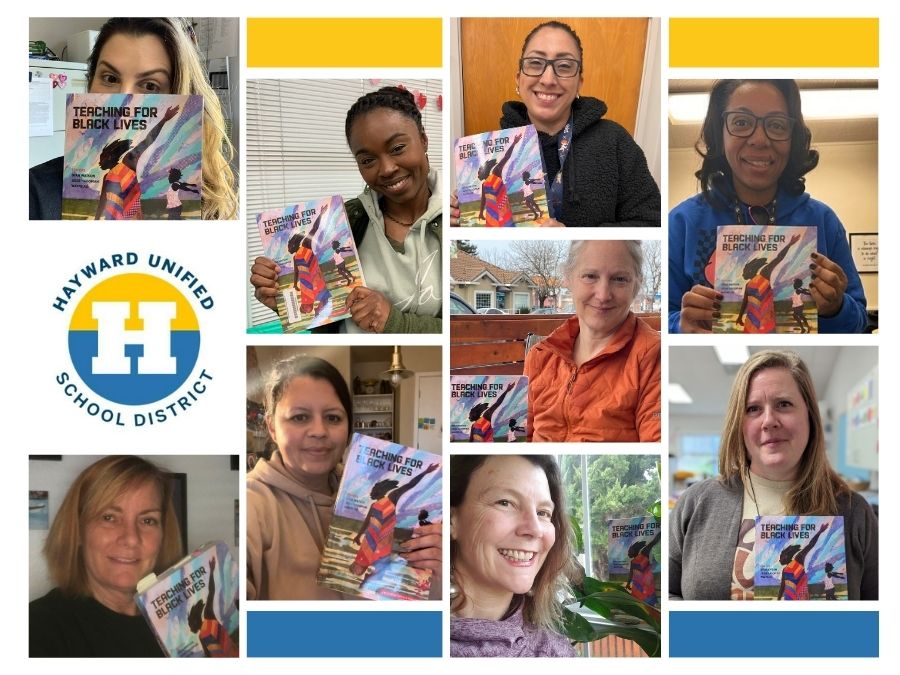
Hayward T4BL Study Group
Twenty-six educators from Hayward Unified School District (HUSD) in California formed a study group that meets monthly “sharing best practices around the anchor text, Teaching for Black Lives,” with the goal to “co-create a resource that we can use internally to build staff capacity to be specifically culturally responsive to our Black students, families, and staff.” Dr. Candace Cofield, the study group coordinator, started the group in 2022 and is continuing to lead educators in this work for the second year in 2023.
Black Lives Matter at School Week of Action
HUSD endorsed the principles and demands of the Black Lives Matter at School Week of Action, sharing a public statement in support of the Week of Action, and generating resources for educators.
During the Week of Action, each Teaching for Black Lives study group member agreed to focus on one of the 13 Principles, “Unapologetically Black,” and host activities at their schools connected to that theme.
Unapologetically Black is the affirmation that Black Lives Matter and that our love and desire for justice and freedom are prerequisites for wanting the same for others.
Organizationally, HUSD aligned events and programming with the BLM Week of Action. They also supported teacher leaders to understand and apply learning from Dr. Gholdy Muhammad’s work, particularly her four-part equity framework: 1) identity development; 2) skill development; 3) intellectual development; and 4) criticality.
In sharing Muhammad’s framework, Dr. Cofield said, “HUSD supported their educators to lean into Black traditions in ways that support ALL learners to be seen, valued, heard, and loved.” Towards that end, the district encouraged schools to utilize funds made available through the Local Control Accountability Plan to devote purely to African American programming.
As a result of these efforts, the study group decided to “formally adopt the Historically Responsive Literacy Framework (HRLF) as something we want to develop lessons around to share from the Teaching for Black Lives perspective.”
Next Steps
During their March meeting, Dr. Cofield, reviewed the HRLF summary slide deck, which included an overview of Muhammad’s framework, an endorsed example of a developed HUSD lesson, and a Google drive to which educators can contribute lessons for sharing and collaboration. She asked the group for feedback and thoughts about what to do next.
Gina Rubino, a librarian, was inspired by the story of Fourth Graders Studying Representation and Book Bans and is planning to implement a similar activity at Stonebrae Elementary to “encourage kids to look at our library and ask: Do we have books that represent you or you can see yourself in?”
Ashley Frey, an elementary special education teacher and induction mentor, talked about the culture of “obedience, compliance, and the policing of behaviors we think are too loud.” In conversation with a new teacher, she noted “how sometimes we hold special ed students to an even higher standard. We ask students not to climb up the slides at recess time, yet, the general ed kids are all climbing up the slides.”
I often feel like it’s difficult to include this demographic of students in critical conversations because of the complex communication needs, but I really want to continue to transform my own practices and my routines — how I have students line up and transition, and empower them. It would be great to have specific resources for special education teachers to be able to reflect. It’s really hard to collaborate in special education because every student and every class is so different.
Dr. Cofield offered a resource she created and said, “I put this together myself around something I witnessed to talk about the carceral logic problem and some potential solutions.” She also noted the need to build out special education resources — not just general education resources — when designing lessons or units.
Daisy Cabus, a secondary English teacher, learned a lot from serving as a special ed teacher and added, “We need to center special education specialists in our planning.”
Nicole Henton, an elementary special education teacher agreed and said, “Being able to meet individual needs is so important and it would be so beneficial to give teachers resources. Sometimes you can feel like you’re on an island — left out.”
Ashley said:
I want to be a bridge builder, too, and collaborate with people as much as I can. It seems like it takes extra effort for special education teachers to have that in your teaching practice but it’s so necessary. Joy is through collaboration and building something together.
Dr. Cofield closed the meeting with a reminder to study group members to take care of themselves and asked each member to select an affirmation to hold in mind.

